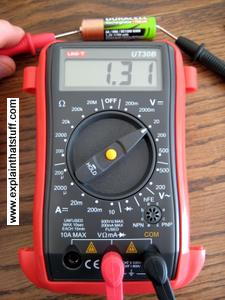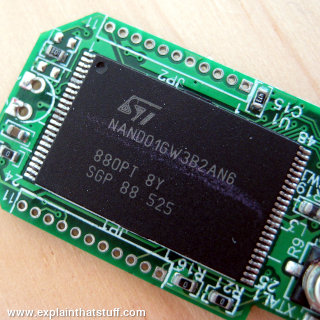Electricity and electronics
Electricity

- Batteries: How does a battery store electricity for years at a time?
- Battery chargers: How does a battery charger work? How long do batteries need charging for?
- Electricity: What is electricity and how can we put it to use?
- Electrical energy monitors: Which of your appliances cost most money to run?
- Electric doorbells: What makes the ding-dong noise when someone rings your bell?
- Electric motors: How can we turn electricity and magnetism into useful power?
- Electrolyzers: How can we make fuel by passing electricity through chemicals?
- Filament lamps: Why do filament lamps get hot and waste so much energy?
- Fuses: What stops your house burning down if there's a sudden surge of electric power?
- Generators: How can you make electricity from spinning motion?
- Heating elements: How can you turn an electric current into hot water?
- History of electricity: How did electric power become such an indispensable technology?
- Hub motors: How can you build an electric motor inside a bicycle or car wheel?
- Induction chargers: Why can electric toothbrushes charge up on plastic stands?
- Induction motors: Why are AC motors often better than DC ones?
- Inverters: How can you change one form of electric current into another?
- Lithium-ion batteries: Why do modern rechargeable batteries last so much longer?
- Moving-coil meters: Measure the voltage or current in a circuit.
- Neon lamps: What makes cities buzz with night-time life?
- OLEDs (organic LEDs) and LEPs (light-emitting polymers): What's the secret technology behind super-flat TVs?
- Piezoelectricity: How can you make electricity by squeezing a lump of quartz?
- RCD circuit breakers: What can save your life if you chop through a power cable?
- Reed switches: How does an intruder alarm detect an opening door or a broken window?
- Relays: How can a tiny current switch on a much bigger current in something like a telephone exchange?
- Static electricity: Why does rubbing something give it an electric charge?
- Stepper motors: How can you make an electric motor precise enough to control a robot?
- Strobe lights: What makes a strobe light flicker so fast?
- Supercapacitors: How can we make capacitors store as much energy as batteries?
- Surge protectors: How can you protect your computer from lightning strikes?
- Transformers: How can you convert a big voltage into a small one (or vice-versa)?
- Voltage optimisation: How can you save energy in a factory by using cleaner, smaller, voltages?
- Xenon lamps: What makes a camera flash so fast and bright?
Electronics

- Amplifiers: How can you make an electric signal bigger or more audible?
- Capacitors: How can you store electricity with sheets of metal separated by thin air?
- Diodes and LEDs: What makes an LED light up?
- Electronics: How can something as small as an electron control your television, radio, or computer?
- Integrated circuits: How do you pack millions of tiny electronic components onto tiny silicon chips?
- Logic gates: How do these simple decision-making circuits power calculators and computers?
- Nixie tubes: How did old-fashioned counter displays work?
- Oscilloscopes: Draw a trace of electrical signals.
- Photoelectric cells: How can a tiny electronic component detect a flash of light?
- Resistors: What are electronic resistors and how do they work?
- Thyristors: What are they—and how do they compare to ordinary diodes and transistors?
- Transistors: How did a tiny electronic component change the world?
- Vacuum fluorescent displays: How does the green display on a cooker or microwave work?
Don't want to read our articles? Try listening instead
If you'd rather listen to our articles than read them, please subscribe to our new podcast on Apple Podcasts, Spotify, Audible, Amazon, Podchaser, or your favorite podcast app, or listen below:
